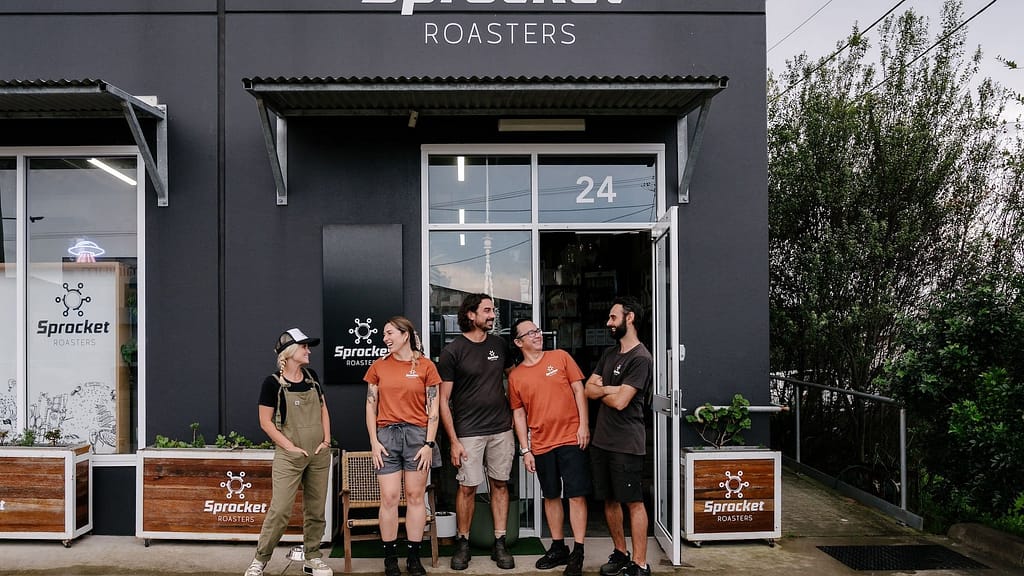[[{“value”:”
How a group of scientific engineers combined their skills to create a space-age coffee roaster that transforms spent grounds into fuel.Two chemical engineers, a viticulturist, and a lawyer walk into a bar … this isn’t the start of a cringe-worthy joke but rather the rough origin story of Sprocket Roasters.
In 2008, John Winter, Chelsea D’Aoust, and Nick and Ross Ciavarella relocated to Newcastle, New South Wales, to use their industry knowledge to establish a biofuels business. Unfortunately, a change in government scuppered their original intentions, so instead they pivoted their plans to apply their knowledge in bioenergy technology to their hobby of coffee roasting.
“What makes us unique as a roaster is that the business was founded on sustainability, and then coffee followed. When the biofuel project didn’t work out, we applied our skills to roasting,” says Sprocket Roasters Co-owner Ross.
“John is an engineer and he’d been working on a more efficient coffee roaster. Traditional roasters are reliant on fossil fuels that contribute to harmful carbon emissions. The answer was to develop a roaster powered entirely by biofuels, specifically spent coffee grounds and organic material. The result is what we believe to be the world’s first clean-air commercial roaster.”
The roaster is designed to avoid the use of fossil fuels and produce zero smoke, while also solving the problem of spent coffee-ground waste. In Australia, 90 per cent of the six million tonnes of used coffee grounds produced each year currently go into landfill. John, Chelsea, Nick, and Ross came up with a solution to convert this waste into fuel.
Unlike conventional drum roasters, their machine uses air to move the beans. By transferring the heat generated by combusting organic waste, the machine creates its own fuel using an enclosed system that drastically reduces emissions.
It also captures the chaff that would usually be disposed of using afterburners and recycles it as fuel.
The unique roaster was manufactured by local fabricators in the Hunter Region of New South Wales. With the technology patented, the group officially established Sprocket Roasters. The name was inspired by the engineering company in the classic carton series The Jetsons – a nod to their new futuristic approach to roasting.
Shortly after, John and Nick left Newcastle to run their respective farming operations, and Ross and Chelsea took the reins of the business. Over a decade on, the roaster is still firing on all cylinders and producing coffee blends and single origins for Sprockets’ wholesale and retail customers in a roasting facility in Lambton. Yet, the roaster is only a part of Ross and Chelsea’s initiatives to make the business as sustainable as possible.
“We have 62 solar panels on the roof that provide most of our energy. It’s reduced our traditional usage by up to 90 per cent – this summer our electricity bill at the roastery was under $10,” says Ross.
Since it was established, Sprocket has ensured its packaging is planet-friendly too. It was the first roaster in Australia to provide beans in reusable tin cans, which are still used to this day to deliver coffee to some of its wholesale customers. Its retail coffee is bagged in fully compostable packaging.
The roastery’s rotating selection of single origin coffees are organic certified and sourced exclusively through green-bean partners that adhere to EcoVadis’ sustainability standards. Its range of blends reference the space theme, with names such as Green Galaxy, Supa Nova, Cosmic, and Milky Way.
“From the outset we’ve been fully committed to doing the best for the environment,” Ross says.
“When we started out, no one in the roasting world really cared about their environmental impact – especially here in Newcastle, the industrial heartland of Australia. However, in the past five years there’s been a huge shift in collective consciousness, and we have a lot of customers who specifically seek us out because of our sustainability principles.”
In 2018, the Sprocket team travelled to Parliament House in Canberra with Bioenergy Australia to make coffee on the front lawn and showcase their roasting technology. Their efforts have also earned the roaster the title of Most Sustainable Business at the Australian Green Global Awards, seen them recognised at the Hunter Innovation Awards, and, most recently, commended at the Australian Bioenergy awards for their commitment to environmental sustainability.
Ross and Chelsea are currently working on developing methods to dry the coffee as they can’t be used as a fuel for the roaster if they contain too much moisture. The plan is to redirect wasted heat energy from the roaster to a machine that will dry the grounds. Feedstock such as recycled pellets are also used for fuel, but Sprocket is always on the hunt for more efficient alternative bioenergy sources.
“We’re committed to continue to self-educate and apply what we learn to our business to make positive contributions to our environment,” says Ross.
“Our aim is to minimise our impact at the roasting stage as the bean travels from producer to consumer.”
For more information, visit sprocketroasters.com.au
This article appears in the June 2024 edition of BeanScene. Subscribe HERE.
“}]]


